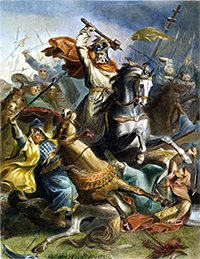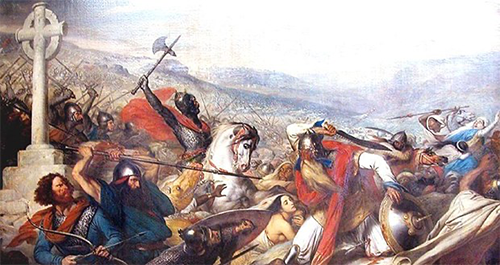Charles Martel
Charles Martel was a Frankish leader and battle commander who was most well-known for winning the Battle of Tours, defeating an invading Muslim army. 
He was born in 686. His father, Pepin II, was Mayor of the Palace, a title that bestowed on its holder the true power in the Frankish kingdom at this time. The Franks still had kings, but the Mayors of the Palace had more to do with the day-to-day running of the kingdom and so had more power than did the monarchs. Pepin declared himself leader of all the Franks in 687 and expected Charles to be his heir. However, Pepin's latest wife, Plectrude, didn't want this and persuaded her husband to throw his son in prison and make his grandson Theudoald, son of Charles's brother Grimoald, the heir to the throne. Charles went to prison in Cologne, which was in the Frankish kingdom of Austrasia. The people there were sympathetic to Charles's plight and, after his escape, declared him Mayor of the Palace. 
Ragenfrid, the Mayor of the Palace in the neighboring Frankish kingdom of Neustria, declared war on Charles and led an army to defeat him. Charles employed the novel strategy of feigning retreat and then rushing back at the pursuers. The result was a crushing defeat for Ragenfrid. In 718, Charles conquered Neustria. He also captured both his stepmother and her preferred successor, Theudoald. He did not put them to death. Turning to the north, he beat back invasions by the Saxons. He was by this time known as "the Hammer," in deference to his military prowess and success. 
In 732, a very large Muslim army invaded Aquitaine and scattered that duchy's defenses, sending Eudes, Duke of Aquitaine, north to plead with Charles Martel for help. The Frankish leader responded with earnest, gathering a large army of his own and setting off to confront the Muslim army, which was led by Abd al-Rahman al-Gafiqi. In the Battle of Tours, Martel scored a great victory for Christendom and for Europe. The Muslim army retreated, never to return. Four years later, the Franks were again up to the task, defeating a seaborne invasion led by Al-Rahman's son. In 737, the Franks defeated the Muslims once and for all, at the River Berre. The all-powerful Charles Martel ruled the Frankish kingdom in his own name for the rest of his life. His last years were relatively peaceful ones, although he did go out of his way to subdue Burgundy in 739. He died in 741, having the year before divided his lands between his sons, Carloman and Pippin III. |
|
Social Studies for Kids
copyright 2002–2026
David White




